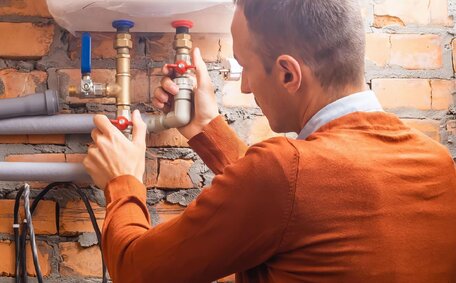What is Sediment Buildup and How Does it Get in My Hot Water System?
Sediment buildup in your hot water system results from the gradual accumulation of minerals, including calcium, magnesium, and lime. These minerals naturally occur in most water supplies, including well water, and With continual water use, sediment accumulates at the bottom of the tank, often visible as scale.
Areas with hard water containing high mineral content are more prone to sediment accumulation in their water systems. As water rich in calcium and magnesium travels into the hot water system, it leaves behind sediment deposits. Areas like Ashfield with moderately hard water can experience sediment accumulation, leading to problems over time if not addressed.
Sediment enters the hot water system and settles inside your heater through the regular supply of tap water. It then settles and compacts at the bottom your hot water heater’s tank, as heavier materials fall out of suspension. Over time, this can result in thick layers of sediment accumulation.
Common Signs Your Hot Water System Has Sediment Issues
Several indicators can alert you to sediment buildup in your hot water system:
- Irregular or fluctuating hot water temperature - As sediment in your hot water tank accumulates at the bottom, it can insulate the water from the heating element, causing the water temperature to be inconsistent.
- Strange noises -
- Reduced hot water flow and low hot water pressure - Thick sediment deposits also cause restrictions in water flowing, resulting in low pressure and limited hot water availability.
- Water stains - Sediment agitated from the bottom of the heater tank can result in hot water that comes out bearing cloudy, brown, or rust-coloured tinges upon use.
- Leaking hot water heater - Accumulated sediment near the tp relief valve can compromise the tank’s integrity, potentially causing small leaks and fissures.
These symptoms progress slowly and may affect warranty coverage if not managed in a timely manner. Paying attention to changes in your whole house hot water systems can help catch too much sediment problems early before they cause appliance damage or failure.
Consequences of Ignoring Sediment Buildup
Neglecting sediment buildup in your water heater can have serious and expensive ramifications. As layers of sediment build up in your water continue to accumulate, your gas water heater will work harder to heat water properly. This major strain can impact both the efficiency and lifespan of your system’s ability to heat your water supply.
Thick sediment deposits end up insulating the water from the source that heats your supply, contributing to your low hot water pressure. To compensate, the heating element operates at higher temperatures and for extended periods, risking damage to your heater and increasing energy bills. Accumulated sediment can also cause issues with your storage hot water system capacity, thus curtailing the quantity of hot water available to you.
Such over-exertion of your system sediment can also lead to the early failure of components such as heating elements, thermostats, and tanks. Sediment-induced overheating can damage your gas water heaters as well as gas electric models. Replacing these parts or the entire appliance can cost hundreds or thousands of dollars.
In severe cases, sediment buildup can eventually lead to complete system failure, resulting in no hot water at all. Ignoring the warning signs almost always results in much higher repair or replacement costs down the track compared to periodic maintenance.
Proactively flushing your water heater and addressing sediment issues through simple techniques or professional assistance can be cost-effective.
How to Prevent Sediment Buildup
To prevent sediment buildup in your water heater system, consider the following measures:
- Flush your heater annually - Use the drain valve to release several litres from the bottom of the heater, clearing sediment deposits. Hire a plumber if uncomfortable doing this yourself.
- Install a water filter or softener - Such devices inhibit mineral crystallisation, thus preventing hard sediment from accumulating in your tank.
- Inspect and replace anode rods - Anode rods attract sediment, sparing the tank from accumulation. Annual inspections and replacements if necessary will protect your tank.
- Seek professional servicing - Regular plumber assessments, including sewer line checks and system flushing, prevent sediment issues from worsening.
Proactive measures maintain maximum efficiency of your hot water system and extend its lifespan. Periodic maintenance from your local experienced team at Ashfield Plumbing also keeps components from failing prematurely.
For professional assistance inspecting or servicing your water heater to inhibit sediment buildup, email us or call 1300 349 338 to speak with one of our licenced plumbers about maintaining your hot water system.
DIY Techniques to Flush Sediment From Your Hot Water System
Homeowners can conduct a simple DIY sediment flush to maintain their gas hot water system efficiency and water quality. Here is a step-by-step guide to addressing sediment built up within your system:
- Turn off the power to your electric water heater at the breaker box and shut off the cold water supply valve.
- Connect a garden hose to the drain valve to drain sediment from the bottom of your hot water tank.
- Open the drain valve and let the sediment out until water flow is crystal clear without any residual buildup water
- Close drain valve and turn cold water back on to refill tank
- Flush the hot water until it runs clear from the taps before turning the power back on.
Always follow your unit’s manufacturer guidelines, as these contain crucial steps for its proper care. For skilled support, contact Ashfield Plumbing; we service major hot water system brands and guarantee prime efficiency.
When to Call a Professional Plumber for Sediment Issues
For the best outcomes in tackling sediment buildup, engage a licensed professional plumber if:
- DIY flushing methods haven’t successfully cleared the sediment or resolved any ongoing problems
- Issues such as a malfunctioning pilot light reoccur shortly after DIY flushing attempts
- Sediment issues combined with gas supply problems may indicate serious complications, such as a cracked heat exchanger.
- Valves or components are stuck or damaged, preventing DIY troubleshooting
- You lack the expertise or cannot safely access equipment like the water tank for maintenance
Our skilled plumbers at Ashfield Plumbing excel in identifying and resolving sediment buildup problems in your plumbing. We can safely open up your hot water system, thoroughly flush the sediment, and check for any other underlying problems contributing to sediment formation.
To book a professional hot water system inspection, email us or call 1300 349 338. Getting ahead of sediment problems minimises long term damage, optimises efficiency, and prevents costly breakdowns.
Maintaining Your Hot Water System After Sediment Removal
After having sediment professionally flushed from your gas electric water heater, it’s important to take proactive steps to prevent further buildup. Here are some tips:
- Monitor your hot water system for fluctuating temperatures, unusual sounds, or diminished water pressure, as these can signal the return of sediment.
- Adjust usage patterns - Setting your water heater below 49°C can help reduce mineral precipitation that leads to sediment.
- Occasionally drain a few litres from the tank every 6-12 months using the cold water valve to prevent sediment buildup.
- Check anode rod - Have a plumber assess the sacrificial anode rod about once a year since wearing away attracts sediment instead of the tank.
- Regular professional maintenance, including inspections, flushing, and water treatment, maintains efficiency and prevents serious issues associated with sediment.
Staying on top of sediment prevention maximises the lifespan of your hot water system. It also optimises performance, saving you money on energy bills over time. For professional assistance, give us a ring and our licenced plumbers at Ashfield Plumbing will offer reliable water heater maintenance tailored to your needs.
For ongoing system care enquiries, email us or call 1300 349 338. Periodic servicing guarantees the continued effectiveness of your hot water system.






